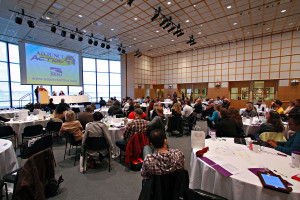 “We say yes.” That was the consensus of a group of over 100 adjunct professors from more than 20 Boston-area colleges who’ve launched an effort to raise standards for their profession and win a voice in the future of higher education by forming a union with Local 888. The public kickoff for the Adjunct Action campaign to unionize contingent faculty across the Boston metro area was held at the JFK library last month.
“We say yes.” That was the consensus of a group of over 100 adjunct professors from more than 20 Boston-area colleges who’ve launched an effort to raise standards for their profession and win a voice in the future of higher education by forming a union with Local 888. The public kickoff for the Adjunct Action campaign to unionize contingent faculty across the Boston metro area was held at the JFK library last month.
“When a university is asking $50,000 in tuition from students, one wonders where the money is going and why it’s not going into instruction,” said Deborah Schwartz, an adjunct professor in the English Department at Boston College. “There’s a systemic problem when the majority of students who walk into their first year English class are taught by adjunct faculty.”
Part-time and non-tenure track faculty are now the majority of faculty at our colleges and universities and their numbers continue to increase. At the same time, revenues and tuition have increased steadily over the last two decades while spending on instruction has declined – and it’s adjuncts and their students who are suffering as a result.
Contingent faculty typically have no job security and low pay that forces adjuncts to string together jobs at multiple colleges and universities to make ends meet. Many adjuncts do not have access to basic facilities like office space and receive little support for research or scholarship. These conditions make it increasingly difficult for adjuncts to do their best for students.
SEIU Local 888 President Mark Dello Russo welcomed the adjuncts, telling them that “Local 888 already has members at both public and private colleges so we are really excited to help spearhead this campaign. Adjuncts deserve to be treated with respect!”
Attendees and panelists linked the problems facing contingent faculty, including low pay, lack of job security and little or no access to benefits, to the “corporatization” of higher education. There is an “increasing corporate mentality of educational institutions,” said one attendee.
Students from Tufts, Northeastern and Emerson attended the event in a show of support for hardworking adjunct faculty, who told stories of staying late and working well beyond the three course hours for which they are paid to write recommendations and provide guidance on papers and coursework.
Todd Ricker, the organizing director for the Adjunct Action, posed a question to the gathered adjuncts as they prepared to engage in discussions about the reasons to organize on their respective campuses. “Do you want things to change or do you want things to remain the same?” he asked.
For more information, visit www.adjunctaction.org
